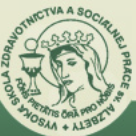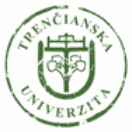Detailed introduction of Slovak Medical University:
Introduction
Slovak Medical University is the only medical university in Slovakia that focuses on health professional education at all three higher education levels. Its educational tradition dates back to 1953. It is located in Bratislava and is a national university.
Overview
Student size: The school has about 3,200 students.
Faculty: It has a faculty composed of scientists who are passionate about medicine. Their professional knowledge and teaching experience provide a strong guarantee for high-quality medical education.
History and establishment time
The school's history can be traced back to the Slovak Physician Training College established in Trencin on May 1, 1953, which provided education for medical personnel until June 30, 1966. In 1992, the school moved to Bratislava. On September 1, 2002, the Slovak Medical University was officially established in accordance with the Act of the National Assembly of the Slovak Republic 401/2002 Coll.
School Strength
Teaching: Provide comprehensive medical education courses from undergraduate to doctoral level, covering multiple professional fields such as nursing, medicine, public health, etc., adopt modern teaching methods, focus on the combination of theory and practice, so that students can better apply what they have learned to practical work. For example, students of the Medical College will have a lot of clinical practice opportunities during their studies, and can participate in the diagnosis and treatment of patients under the guidance of professional doctors to improve their clinical skills.
Scientific research: The school has built a scientific research base and actively carries out medical scientific research activities. It has achieved a series of important research results in the field of medicine and has contributed to the advancement of medical science. The school's scientific research results are not only widely used in China, but also have a certain impact internationally.
International Exchange: As a medical university with an international vision, it has established cooperative relations with major European educational institutions, actively carried out student exchange programs and joint research programs, etc., providing a broad international exchange platform for students and teachers, and promoting the international dissemination of medical knowledge and culture.
Institutional Nature
National University.
Educational Philosophy
Operating in the spirit of the World University Charter, adhering to the values of democracy, humanism, and tolerance, guiding students to abide by the principles of the Hippocratic Oath, and committed to cultivating medical talents with high professionalism and moral qualities, emphasizing the protection of life and health, from conception to decent natural death.
Key laboratories and disciplines
Key disciplines: Medicine, nursing, public health and other disciplines are the school's key disciplines, which have a certain reputation and influence in Slovakia and even internationally. Among them, the education level and scientific research strength of the medical major are particularly outstanding, providing a solid foundation for the training of excellent doctors and medical researchers.
Laboratory situation: The school is equipped with advanced medical laboratory facilities, such as anatomy laboratories, physiological laboratories, pathology laboratories, etc., which provide good conditions for students' practical teaching and scientific research activities. These laboratories have modern instruments and advanced technical means to meet the teaching and research needs of different levels and professions.
Department Settings
The school has the following 4 colleges:
College of Nursing and Medicine: Trains professionals such as nurses, radiologists, physiotherapists, obstetricians and emergency personnel. Graduates can work in private and public hospitals in Europe, Canada and the United States.
Medical College: Provides 6 consecutive years of higher education in dentistry and general medicine. Its graduates are welcomed all over the world because of the school's modern teaching methods.
School of Public Health: Students mainly learn professional knowledge in the field of public health. In the future, they can become experts in general health, infectious diseases, production safety, etc. In addition to working in hospitals, they can also work in insurance companies and pharmaceutical companies.
School of Health: Located in Banská Bystrica, it trains professionals who can serve as nurses, caregivers and laboratory staff. The quality of education in this college is comparable to that of the college in Bratislava. Its graduates can not only cure diseases and save lives, but also make important contributions to scientific research.
Ranking
There is no clear international comprehensive ranking data, but it has an important position in the field of medical education in Slovakia, and its medical major ranks high in the country.
Expenses
Tuition fees: For international students, courses taught in Slovak can be studied for free, but you need to master Slovak at the B2 level; courses taught in English require a certain tuition fee, and the specific fee varies depending on the major and course.
Living expenses: In Bratislava, the monthly living expenses are approximately between 350-500 euros, of which accommodation costs are approximately 200-300 euros/month and food costs are approximately 150-200 euros/month.
Campus
Campus facilities: The campus is located in Bratislava, with convenient transportation and beautiful surrounding environment. The campus has modern teaching buildings, libraries, laboratories, student dormitories, gymnasiums, restaurants and other facilities, providing students with good learning and living conditions.
Campus life: The school focuses on cultivating students' comprehensive qualities and organizes a variety of campus cultural activities, such as academic lectures, cultural festivals, sports competitions, student club activities, etc., which enrich students' extracurricular life and enhance communication and cooperation among students.
-

St. Elizabeth College of Health and Social Work
-

University of St. Cyril and Methodius in Trnava
-

Matej Bel University in Banská Bystrica
-

Technical University of Kosice
-

Slovak University of Agriculture in Nitra
-

Comenius University in Bratislava
-

Pavol Josef Safarik University
-

Slovak University of Technology in Bratislava
-

Alexander Dubcek University, Trencin
-

University of Žilina
-

Mesoamerican University
-

Istmo University
-

Mariano Galvez University of Guatemala
-

Regional University of Guatemala
-

Galileo University
-

Francisco Marroquín University
-

Rafael Landívar University
-

University of the Valley of Guatemala
-

University of San Carlos of Guatemala
-

Technological Institute of Tlaxcala Plateau
-

Golfo University
-

Technological University of South Sonora
-

Technological University of Huejotzingo
-

Tizimín Institute of Technology
-

Chilpancingo Institute of Technology

